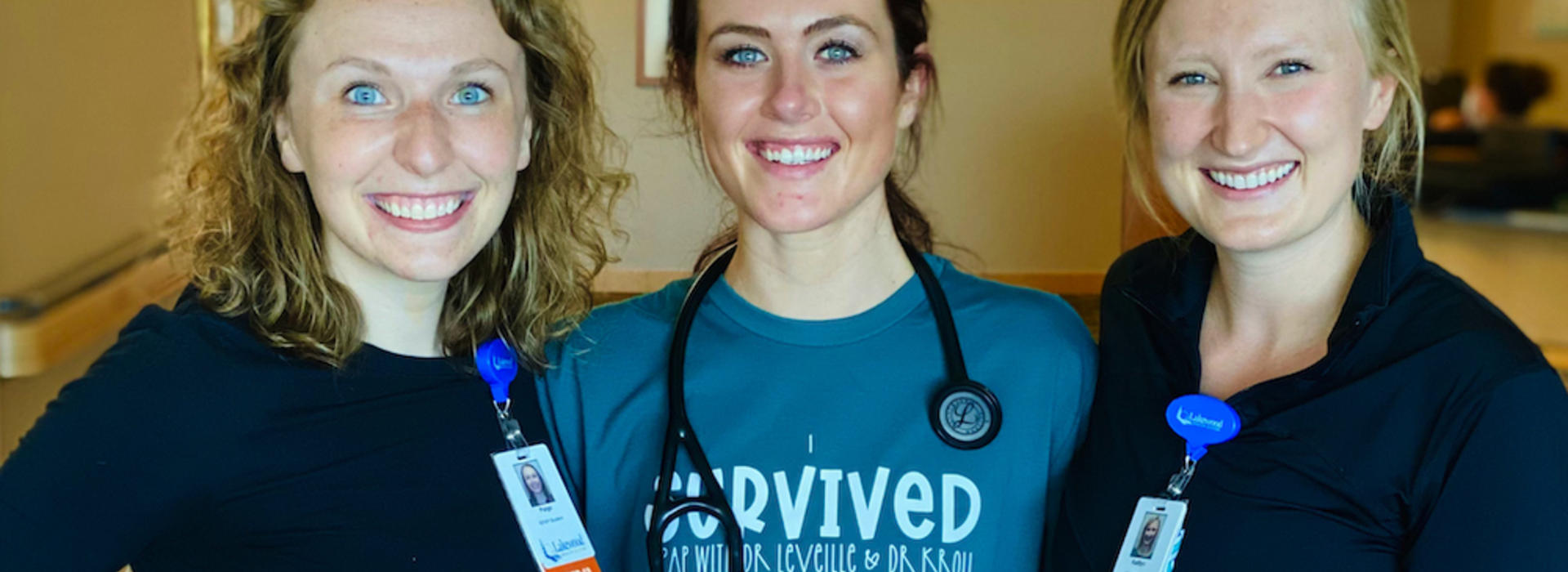
A Legacy of Training Rural Physicians
For some rural communities, the nearest physician might be hours away, even in emergencies. While about 20% of the U.S. population lives in rural areas, only 11% of physicians practice in that setting, and 3 out of 5 federally designated health professional shortage areas are in rural regions. Attracting the next generation of physicians to rural medicine is critical.
“I grew up in a small town in North Dakota, so I’ve always wanted to practice rural because that’s where I could see myself living in the future,” said Cassidy Peterson, a third-year student at the University of Minnesota Medical School. “That was one of the big reasons I was interested in starting at the Duluth Campus.”
Cassidy, along with third-year Medical School students Kaitlyn Anderholm and Paige Carlson, followed their passion for rural health to the Rural Physician Associate Program (RPAP), a unique nine-month, community based educational experience for third-year medical students to train in rural communities across Minnesota and western Wisconsin. The program just celebrated its 50th class of graduates.
Community Focused Training
Since RPAP’s inception, over 122 Minnesota communities have hosted medical students, who move to their training location and become part of the community. Cassidy, Kaitlyn and Paige were assigned to Staples, Minn., a town of about 3,000.
“One of the things the program prides itself on is the integration of the students into the community,” Kaitlyn said.
Staples has been a long-time RPAP supporter and hosts many students, some of whom have gone back to work in the community after becoming physicians. This means clinical staff, patients and physicians are accustomed to having students – making it an especially welcoming environment.
“The preceptors are wonderful, and a lot of them are RPAP graduates themselves,” Paige said. “They know what to expect and they’re willing to let you take more responsibility as you progress through your training.”
RPAP has expanded its reach to include 34 teaching sites – most of which have at least one program graduate – and 61 preceptors.
“There are so many students who have gone back to practice at their RPAP site because it’s such an impactful experience,” Cassidy said. “It gives you physicians to look up to and they really help you develop your skills and confidence throughout the duration of the program.”
A 50-Year Legacy
Apart from being the 50th class, the cohort had a memorable experience through the COVID-19 pandemic.
“It was really unique to see a small, independent healthcare system tackle this global pandemic head on,” Kaitlyn said. “Witnessing the ingenuity and scrappiness of the reality of rural medicine firsthand was really incredible.”
All three of the program’s graduates felt that they actually had more hands-on experience due to the pandemic, which some of their peers in urban areas missed out on due to virtual rotations.
“The nursing staff was stretched thin, so our hands were utilized at all times,” Kaitlyn said. “I think I actually had a richer RPAP experience as a result of the pandemic because the whole community and healthcare system came together.”
The students were exposed to a variety of practice settings, including the hospital, clinic and emergency room.
“My preceptors were family physicians and had many roles at Lakewood – ER, hospitalist, clinic, OB – they did it all and it was an ideal learning environment for a student,” Cassidy said. “I think that’s what makes it so much fun and such a good learning experience.”
They also felt they had increased autonomy matched with their skill level.
“I saw a lot of patients by myself to come up with a plan, which I would discuss with my preceptor,” Paige said. “ The preceptors were all knowledgeable and would let me come up with a recommendation and then discuss it together.”
Over the course of its 50-year history, RPAP has trained over 1,600 graduates. Two out of three alumni practice in Minnesota, over 40% practice in rural settings and 75% are in primary care.
“No matter where students end up, I still believe RPAP will be a valuable experience,” Cassidy said. “RPAP prepares students to be better future physicians and that is its true legacy.”